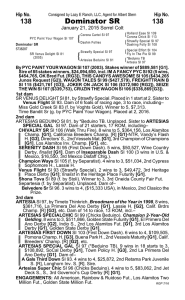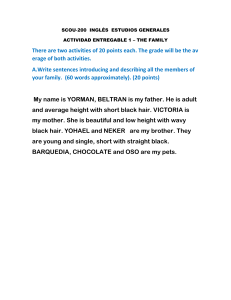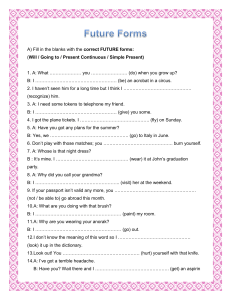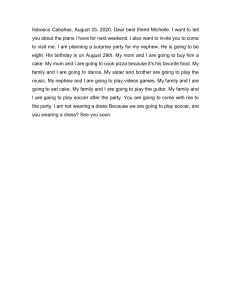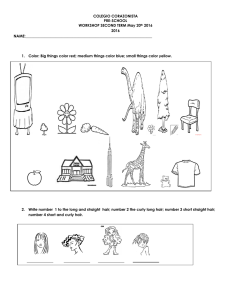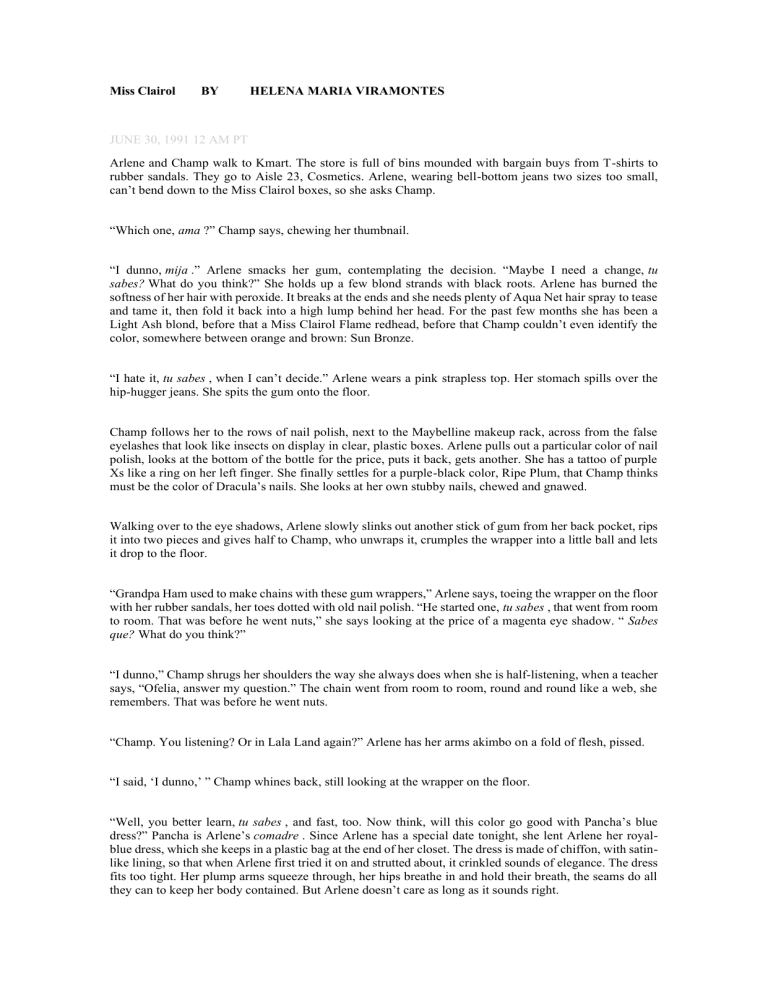
Miss Clairol BY HELENA MARIA VIRAMONTES JUNE 30, 1991 12 AM PT Arlene and Champ walk to Kmart. The store is full of bins mounded with bargain buys from T-shirts to rubber sandals. They go to Aisle 23, Cosmetics. Arlene, wearing bell-bottom jeans two sizes too small, can’t bend down to the Miss Clairol boxes, so she asks Champ. “Which one, ama ?” Champ says, chewing her thumbnail. “I dunno, mija .” Arlene smacks her gum, contemplating the decision. “Maybe I need a change, tu sabes? What do you think?” She holds up a few blond strands with black roots. Arlene has burned the softness of her hair with peroxide. It breaks at the ends and she needs plenty of Aqua Net hair spray to tease and tame it, then fold it back into a high lump behind her head. For the past few months she has been a Light Ash blond, before that a Miss Clairol Flame redhead, before that Champ couldn’t even identify the color, somewhere between orange and brown: Sun Bronze. “I hate it, tu sabes , when I can’t decide.” Arlene wears a pink strapless top. Her stomach spills over the hip-hugger jeans. She spits the gum onto the floor. Champ follows her to the rows of nail polish, next to the Maybelline makeup rack, across from the false eyelashes that look like insects on display in clear, plastic boxes. Arlene pulls out a particular color of nail polish, looks at the bottom of the bottle for the price, puts it back, gets another. She has a tattoo of purple Xs like a ring on her left finger. She finally settles for a purple-black color, Ripe Plum, that Champ thinks must be the color of Dracula’s nails. She looks at her own stubby nails, chewed and gnawed. Walking over to the eye shadows, Arlene slowly slinks out another stick of gum from her back pocket, rips it into two pieces and gives half to Champ, who unwraps it, crumples the wrapper into a little ball and lets it drop to the floor. “Grandpa Ham used to make chains with these gum wrappers,” Arlene says, toeing the wrapper on the floor with her rubber sandals, her toes dotted with old nail polish. “He started one, tu sabes , that went from room to room. That was before he went nuts,” she says looking at the price of a magenta eye shadow. “ Sabes que? What do you think?” “I dunno,” Champ shrugs her shoulders the way she always does when she is half-listening, when a teacher says, “Ofelia, answer my question.” The chain went from room to room, round and round like a web, she remembers. That was before he went nuts. “Champ. You listening? Or in Lala Land again?” Arlene has her arms akimbo on a fold of flesh, pissed. “I said, ‘I dunno,’ ” Champ whines back, still looking at the wrapper on the floor. “Well, you better learn, tu sabes , and fast, too. Now think, will this color go good with Pancha’s blue dress?” Pancha is Arlene’s comadre . Since Arlene has a special date tonight, she lent Arlene her royalblue dress, which she keeps in a plastic bag at the end of her closet. The dress is made of chiffon, with satinlike lining, so that when Arlene first tried it on and strutted about, it crinkled sounds of elegance. The dress fits too tight. Her plump arms squeeze through, her hips breathe in and hold their breath, the seams do all they can to keep her body contained. But Arlene doesn’t care as long as it sounds right. “I think it will,” Champ says, and Arlene is very pleased. “Think so? Me too, mija .” They walk out the double doors and Champ never remembers her mother paying. It’s four in the afternoon, but already Arlene is preparing for her date. She scrubs the tub, Art Laboe on the radio, and drops crystals of Jean Nate into the running water; lemon scent rises with the steam. With the bathroom door ajar, she removes her top, and her breasts sag. She pushes her jeans down with some difficulty, kicks them off and steps into the tub. “ Mija . MIJA ,” she yells, “give me some bobby pins.” She is worried about her hair frizzing; she wants to pin it up. Her mother’s voice is faint because Champ is in the closet. There are piles of clothes on the floor, hangers askew and tangled, shoes piled up or thrown on the top shelf. Champ is looking for her mother’s special dress. Pancha says every girl has one at the end of her closet. “Champ. CHAMP!” Amid the dirty laundry, in the black hole of the closet, she finds nothing. “Cheeze, ama , stop yelling,” says Champ and goes into the steamy bathroom. She checks the drawers. Brushes jump out, rollers, strands of hair, bars of soap, combs, eye shadows. She finds nothing, pulls open another drawer--powder, an empty bottle of oil, manicure scissors, Kotex, dye instructions crinkled and blotched and, finally, a few bobby pins. After Arlene pins up her hair, she asks Champ, “ Sabes que? Should I wear my hair up? Do I look good with it up?” Champ is sitting on the toilet. “Yeah, ama , you look real pretty.” “Thanks, mija ,” says Arlene. “You know, when you get older I’ll show you how you can look real pretty, too.” She puts her head back, relaxes, like the Calgon commercials. Champ lies on her stomach, TV on to a variety show with pogo-stick dancers dressed in outfits of stretchy material and glitter. She’s wearing one of her brother Gregorio’s white T-shirts, the ones he washes and bleaches himself so that the whiteness is impeccable. It drapes over her 10-year-old body like a dress. She is busy cutting out Miss Breck models from a stack of old magazines Pancha found in the back of her mother’s garage. Champ collects the array of honey-haired women, puts them in a shoe box with all her other special things. Arlene is in the bathroom, wrapped in a towel. She has painted her eyebrows so that the two are arched and even, pencil-thin and high. Magenta shades her eyelids. The towel slips and reveals one nipple blind from a cigarette burn, a date to forget. She rewraps the towel, likes her reflection, turns to her profile for additional inspection. She feels good, turns up the radio to “YOUR LOVE, for your love, oh I will do anything, yes I will do anything fo-o-or your lo-o-ove. FOR YOUR KISS. . . .” Champ looks on. Through the open bathroom door she can see Arlene, anticipation burning like a cigarette, swaying her shoulders to the “ahhh, ahhh,” her lips pouting until the song ends. And Champ likes her mother that way. Arlene carefully stretches black eyeliner, like a fallen question mark, around each eye. The work is delicate; her hand trembles cautiously. She stops the process to review her face with each line. Arlene in the mirror is not Arlene in the flesh, who has worn too many relationships, gotten too little sleep. The last touch is chalky beige lipstick. By the time she is finished, her ashtray is full of cigarette butts, Champ’s variety show is over, and Jackie Gleason’s dancing girls come on to make kaleidoscope patterns with their long legs and arms. Gregorio is still not home, and Champ goes over to the window, checks the houses, the streets, the corners, roams the sky with her eyes. Arlene sits on the toilet, stretches up her nylons, clips them to her girdle. She feels good thinking about the way he will unsnap her nylons, and she will unroll them slowly, pointing her toes when she does. Champ opens a can of Campbell’s chicken-with-rice soup, finds a perfect pot in the middle of a stack of dishes, pulls it out with a threatening rumble. She washes it, pours in the contents of the red-and-white can, turns the knob. After it boils, she puts the pot on the sink to cool and searches for a spoon. Arlene is a romantic. When Champ begins her period, she will tell her things that only women can know. She will tell her about the first time she made love with a boy, her awkwardness and shyness forcing them to go under the house, where the cool, refined soil made a soft mattress. His penis was the softest and warmest skin she had ever felt, and she gathered her dress up, raised her knees. She opened her eyes at the sound of laughter, saw her younger sister’s legs chasing a loose ball. Arlene was 11, and his name was Harry. She will not tell Champ about Puppet, from Maravilla, who ejaculated on her thigh at the sight of her. She pushed him away, rubbed the gooey substance off with her dress in disgust, ran home double time to tell Pancha, her mouth open with laughter. Arlene puffs powder under her arms, between her breasts, sneezes. She tilts a small bottle of Love Cries perfume, dabs behind her ears, at her neck and shoulders, for those tight, caressing songs. She wants him to squeeze the scent from her body so that even with his eyes closed, even with the dance floor so crowded, he will not forget who she is. Champ sits in the radius of the TV’s gray light, spooning her soup from the pot. Jackie Gleason is a bartender in a saloon. He wears a black bow tie, a white apron and polishes a glass. Arlene is a romantic. She will dance until Pancha’s dress turns a different color, dance until her hair becomes undone, her hips jiggling and quaking beneath a new pair of hosiery, her mascara shadowing her eyes from the perspiration of the ritual, dancing, spinning herself into Miss Clairol, only stopping when it is time to return to the sewing factory, time to wait out the next date, time to change hair color. Time to remember or to forget. Champ sees Arlene from the window. She can barely hear her mother’s nylons rubbing against one another, the crinkling sound of satin when she gets in the blue-and-white shark-finned Dodge. Arlene’s lipstick left a kiss stinging on Champ’s cheek. She rubs it off, watches Miss Clairol depart, wonders what time Arlene will return.

